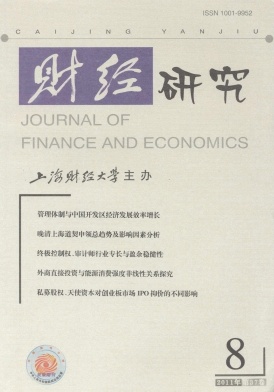外商直接投资与能源消费强度非线性关系探究——基于开放条件下环境“库兹涅茨曲线”框架的分析
财经研究 2011 年 第 37 卷第 08 期, 页码:80 - 91
摘要
参考文献
摘要
文章研究了在东道国人均收入水平差异的影响下,FDI对于降低本国能源消费强度、提高能源利用效率的作用是否相同,并且对这种作用的显著程度和潜在的作用空间进行了分析。文章借鉴"环境库兹涅茨曲线"理论,以人均收入与能源利用效率的非线性模型作为分析框架,使用1985-2008年包含74个高收入和中低收入国家的全球面板数据进行了实证检验。结果验证了"引入FDI能够提高本国的能源利用效率,降低能源消费强度"这一假设,同时,证明了"环境库茨涅茨曲线"理论在能源消费领域的适用性,即人均收入与能源消费强度之间存在"倒U型"关系。文章之后通过在模型中引入交叉项验证了更高的人均收入水平能够更好地促进东道国对FDI的吸收,从而降低能源消费强度、提高能源利用效率。
[1]何一峰.转型经济下的中国经济趋同研究——基于非线性时变因子模型的实证分析[J].经济研究,2008,(7):39-51.
[2]齐绍洲,罗威.中国地区经济增长与能源消费强度的差异分析[J].经济研究,2007,(7):74-81.
[3]齐绍洲,云波,李锴.中国经济增长与能源消费强度差异的收敛性及机理分析[J].经济研究,2009,(4):56-64.
[4]赵进文,范继涛.经济增长与能源消费内在依从关系的实证研究[J].经济研究,2007,(8):31-42.
[5]Mielnik O,Goldemberg J.Foreign direct investment and decoupling between energy and gross domestic product in developing countries[J].Energy Policy,2002,30:87-89.
[6]Cole M A.Does trade liberalization increase national energy use?[J].Economics Letters,2006,92:108-112.
[7]Keller W,International technology diffusion[J].Journal of Economic Literature,2004,42(3):752-782.
[8]Borensztein E,De Gregorio J,Lee J-W.How does foreign direct investment affect economic growth?[J].Journal of International Economics,1998,45:115-135.
[9]Hübler M,Keller A.Energy saving via FDI?Empirical evidence from developing countries.[J].Environment and Development Economics,2010,15:59-80.
[10]Alfaro L,Chanda A,Kalemli-Ozcan S,Sayek S.Does foreign direct investment promote growth?Exploring the role of financial markets on linkages[J].Journal of Development Economics,2010,91:242-256.
[11]Eskeland G,Harrison A.Moving to greener pastures?Multinationals and the pollution haven hypothesis[J].Journal of Development Economics,2003,70(1):1-23.
[12]Fisher-Vanden K,Jefferson G H,Liu H,Tao Q.What is driving China’s decline in energy intensity?[J].Resource and Energy Economics,2004,26:77-97.
[13]Alfaro L,Chanda A,Kalemli-Ozcan S,Sayek S,FDI and economic growth:The role of local financial markets[J].Journal of International Economics 2004,64:89-112.
[14]Lee C,Chang C,FDI,financial development,and economic growth:international evidence[J].Journal of Applied Economics.2009,12(2),249-271.
[15]Shafik N.Economic development and environmental quality:An econometric analysis[J].Oxford Economic Papers,1994,46:757-773.
[16]Grossman G M,Krueger A B,Economic growth and the environment[J].The Quarterly Journal of Economics,1995,110(2):353-377.
[17]Grossman G M,Krueger A B.Environmental impacts of a North American free trade agreement[R].NBER Working Paper,No.3914,1991.
[18]Antweiler W.Copeland B R,Taylor M S.Is free trade good for the environment?[J].The American Economic Review,2001,91(4):877-908.
[19]Easterly M,Levine R,Africa’s growth tragedy:A retrospective,1960-1989[R].World Bank Policy Research Working Paper,No.1503,1995.
[20]Javorcik B S.The composition of foreign direct investment and protection of intellectual property rights:Evidence from transition economies[J].European Economic Review 2004,48(1):39-62.
[2]齐绍洲,罗威.中国地区经济增长与能源消费强度的差异分析[J].经济研究,2007,(7):74-81.
[3]齐绍洲,云波,李锴.中国经济增长与能源消费强度差异的收敛性及机理分析[J].经济研究,2009,(4):56-64.
[4]赵进文,范继涛.经济增长与能源消费内在依从关系的实证研究[J].经济研究,2007,(8):31-42.
[5]Mielnik O,Goldemberg J.Foreign direct investment and decoupling between energy and gross domestic product in developing countries[J].Energy Policy,2002,30:87-89.
[6]Cole M A.Does trade liberalization increase national energy use?[J].Economics Letters,2006,92:108-112.
[7]Keller W,International technology diffusion[J].Journal of Economic Literature,2004,42(3):752-782.
[8]Borensztein E,De Gregorio J,Lee J-W.How does foreign direct investment affect economic growth?[J].Journal of International Economics,1998,45:115-135.
[9]Hübler M,Keller A.Energy saving via FDI?Empirical evidence from developing countries.[J].Environment and Development Economics,2010,15:59-80.
[10]Alfaro L,Chanda A,Kalemli-Ozcan S,Sayek S.Does foreign direct investment promote growth?Exploring the role of financial markets on linkages[J].Journal of Development Economics,2010,91:242-256.
[11]Eskeland G,Harrison A.Moving to greener pastures?Multinationals and the pollution haven hypothesis[J].Journal of Development Economics,2003,70(1):1-23.
[12]Fisher-Vanden K,Jefferson G H,Liu H,Tao Q.What is driving China’s decline in energy intensity?[J].Resource and Energy Economics,2004,26:77-97.
[13]Alfaro L,Chanda A,Kalemli-Ozcan S,Sayek S,FDI and economic growth:The role of local financial markets[J].Journal of International Economics 2004,64:89-112.
[14]Lee C,Chang C,FDI,financial development,and economic growth:international evidence[J].Journal of Applied Economics.2009,12(2),249-271.
[15]Shafik N.Economic development and environmental quality:An econometric analysis[J].Oxford Economic Papers,1994,46:757-773.
[16]Grossman G M,Krueger A B,Economic growth and the environment[J].The Quarterly Journal of Economics,1995,110(2):353-377.
[17]Grossman G M,Krueger A B.Environmental impacts of a North American free trade agreement[R].NBER Working Paper,No.3914,1991.
[18]Antweiler W.Copeland B R,Taylor M S.Is free trade good for the environment?[J].The American Economic Review,2001,91(4):877-908.
[19]Easterly M,Levine R,Africa’s growth tragedy:A retrospective,1960-1989[R].World Bank Policy Research Working Paper,No.1503,1995.
[20]Javorcik B S.The composition of foreign direct investment and protection of intellectual property rights:Evidence from transition economies[J].European Economic Review 2004,48(1):39-62.
引用本文
孙浦阳, 武力超, 陈思阳. 外商直接投资与能源消费强度非线性关系探究——基于开放条件下环境“库兹涅茨曲线”框架的分析[J]. 财经研究, 2011, 37(8): 80–91.
导出参考文献,格式为:





 6829
6829  4921
4921

